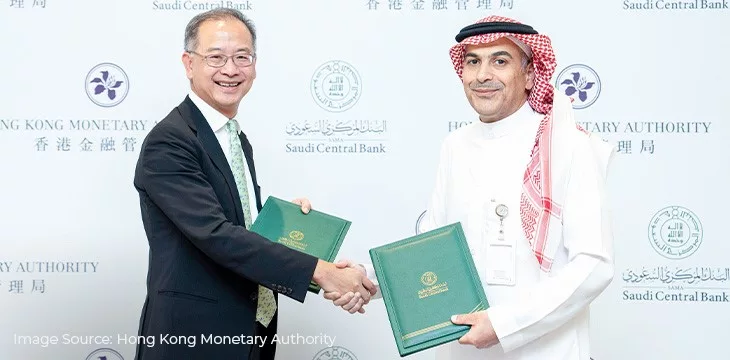|
Getting your Trinity Audio player ready...
|
The Hong Kong Monetary Authority (HKMA) and the Saudi Central Bank (SAMA) have signed a Memorandum of Understanding (MoU) to conduct joint studies in financial innovation for the benefit of their local economies.
Both central banks signed the MoU at a meeting in Riyadh with HKMA’s Chief Executive Eddie Yue in attendance. During the meeting, the HKMA and the SAMA shared ideas about the four key sectors—open market operations, market connectivity, sustainable development, and financial infrastructure development.
The MoU will see both banking regulators team up to experiment with the best methods to integrate tokenization into their financial systems. While Hong Kong is thriving to become a major hub for digital currencies, Saudi Arabia has adopted a conservative approach, with experts predicting that the new collaboration could see the Middle Eastern country soften its stance toward the asset class.
For Ayman Alsayari, Governor of the SAMA, the MoU is a step in the right direction toward diversifying the Saudi economy. It will help the country “stay at the cutting edge” in dealing with novel financial issues.
The MoU did not mention digital currencies, although both countries will be examining the prospects of a central bank digital currency (CBDC).
“There is huge potential for collaboration between the Kingdom of Saudi Arabia and Hong Kong in areas spanning across economy and trade, sustainable development, finance, and Fintech,” said Yue. “The MoU, in particular, will further enhance mutual cooperation as well as exchange of information and expertise between the SAMA and the HKMA in financial innovation and Fintech.”
Hong Kong has a string of bilateral arrangements targeted explicitly at the Middle East. In early June, the HKMA entered a partnership with the Central Bank of the United Arab Emirates (CBUAE) to develop digital currency regulations and to improve the current state of financial infrastructure.
Besides regulations, the HKMA and the CBUAE agreed to study the upsides of using digital currencies in streamlining cross-border transactions.
The HKMA and the PBoC are also collaborating using CBDCs for international remittances, with many initiatives in the works.
Hong Kong wants to become the digital assets global hub
Following the passing of a new regulation allowing retail investors to dabble in digital currencies on authorized exchanges, Hong Kong is leaning toward becoming the global hub for all digital assets.
With a new licensing regime, Hong Kong is confident in attracting leading service providers to set up operations in the jurisdiction. Administrators hope to sweeten the deal through a seamless registration process, a deep talent pool, and free trade zones dedicated to incubating digital asset firms.
The city-state expects over 80 global firms to set up shop in the country, lured by the prospects of a lighter tax burden and a Web3 development fund included in its annual budget.
CoinGeek Conversations with Jack Davies: The mission is to prove to the world what’s possible on BSV blockchain

 07-05-2025
07-05-2025 





